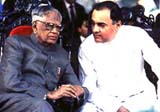The Rediff Interview/R Venkataraman
'Any hotchpotch arrangement will be so unstable that economic
development will become a casualty'
He has to?
 I don't say he has to. He should. That is the Constitutional
position if you follow the British Constitution. This question
has not been settled in India. For instance, Chandra Shekhar was
not defeated in the House, but after giving the resignation, he
advised me to dissolve the House. I accepted the resignation but
asked him to continue till further arrangements were made.
I don't say he has to. He should. That is the Constitutional
position if you follow the British Constitution. This question
has not been settled in India. For instance, Chandra Shekhar was
not defeated in the House, but after giving the resignation, he
advised me to dissolve the House. I accepted the resignation but
asked him to continue till further arrangements were made.
As far as the decision to dissolve the House (was concerned), I wanted
some time to think. The question was whether his advice was binding
on me or not. But there was another factor in that case. No other
party was ready to form the government. Therefore I said, the
prime minister recommended that the House be dissolved and that
no other party was prepared to shoulder the responsibility of forming
the government and dissolved the House.
So, in this changed scenario, what should the President do?
Constitutionally the President has to accept the advice of
the prime minister if you follow the British Constitution. Ever
since the days of Queen Anne who once refused to accept the advice
of the prime minister, the prime minister's advice for dissolution
has always been accepted.
As a senior citizen of India, as a former President,
how do you assess the present day uncertainties?
 I may be a pessimist now. I think nobody will be able to form
a government and we are heading towards a general election. Any
other hotchpotch arrangement will be so unstable that economic
development will become a casualty. All the time they would be
striving to survive so they will have no time to serve the people
or the country.
I may be a pessimist now. I think nobody will be able to form
a government and we are heading towards a general election. Any
other hotchpotch arrangement will be so unstable that economic
development will become a casualty. All the time they would be
striving to survive so they will have no time to serve the people
or the country.
Do you feel sad about the way the Congress, a party you
were associated with, has behaved? The general public feel
they acted very selfishly.
The motive in politics is self interest now. The days
when people jumped into the freedom movement, sacrificing their
career, properties, family, are all over. Today, politics is like
any other profession. And everybody wants to come up in politics
like everybody wants to come up in law, medicine, education, engineering
etc.
Soon after the election, when I interviewed you, you told
me that there was a halo around politicians who participated
in the freedom struggle which is lacking in today's political
leaders. You also told me that in such circumstances, the chances
of any single party coming to power are very slim. Do you still
feel so?
The chances are fewer. That's why I talked about coalition
governments. But this 13-party hotch potch is not a real coalition.
The constituent parties today assert their views against the government's
decision. There is no feeling of joint responsibility.
Is it good for the country to have a coalition government
formed after the election?
If you ask, what is ideal for the country, I would say, a two
party system.
Will it happen?
It will not. Because the tendency among people to form splinter
groups whenever there is a difference of opinion has become a habit.
It was not as if earlier there was no difference of opinion, But
the mere fact that there was some difference of opinion did not
lead them to split the party and form another group. Today at
the drop of a hat, you get out of the party and form another group.
Some political analysts are talking about a two party system
featuring the BJP and Congress at the Centre in the future. Do
you foresee anything of that sort?
I think this country will not elect a single party to
power. There will a large number of splinter parties.
That means we will have to face this kind of situation quite
often.
Yes, it will be the same.
Tell us what you think of this interview
|





